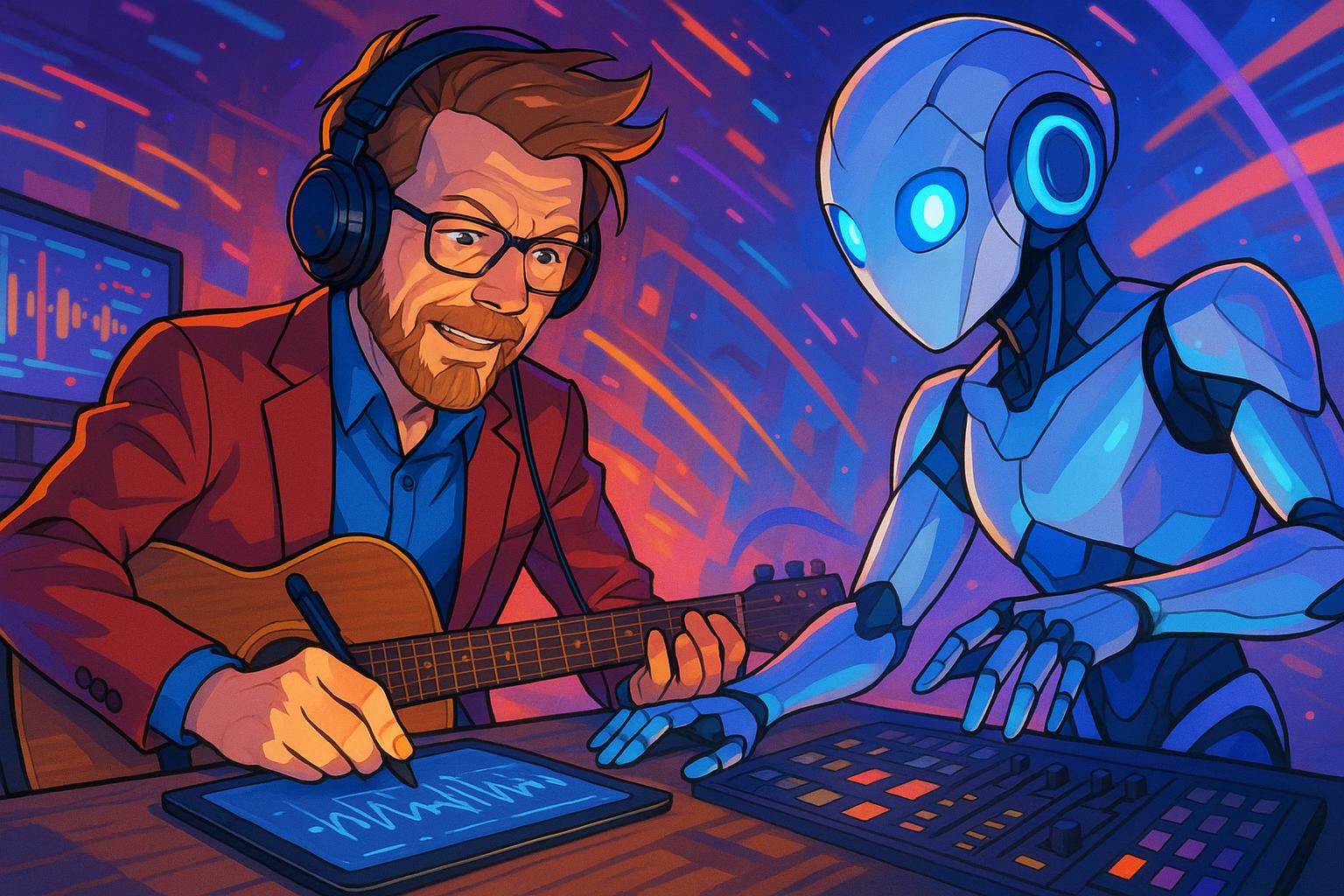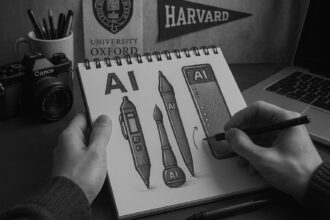Björn Ulvaeus, co-founder of ABBA, reveals use of artificial intelligence in creating a new musical, highlighting innovation while voicing concerns over the impact of AI on artists’ earnings and the need for fair compensation.
Björn Ulvaeus, the iconic founding member of the legendary pop group ABBA, is venturing into new creative territory by utilising artificial intelligence in the development of a new musical. During a recent presentation at SXSW London, Ulvaeus revealed that he is “three-quarters” through the writing process, emphasising the revolutionary potential of AI as a songwriting companion. “It’s fantastic. It is such a great tool,” he stated, noting that collaborating with AI feels like working alongside another songwriter endowed with an extensive reference database.
Ulvaeus’s enthusiasm for exploring modern technology is not unprecedented; he and fellow ABBA member Benny Andersson have a history of embracing innovation, from the early adoption of synthesizers to digital recording techniques. This latest project follows the band’s remarkable return in 2021 with the album “Voyage” and the corresponding digital concert experience “ABBA Voyage,” which reportedly sold over two million tickets in its first 19 months. This momentum illustrates Ulvaeus’s commitment to pushing the boundaries of musical creativity.
Despite his excitement, Ulvaeus acknowledged the limitations of AI, describing it as “lousy at [writing a whole song]” and “very bad at lyrics.” He explained that while the generated content may often be subpar, it can sometimes spark new ideas that propel the creative process forward. “You can prompt a lyric you have written about something, and you’re stuck maybe,” he elaborated, “and you want this song to be in a certain style.”
However, Ulvaeus is also acutely aware of the broader implications of AI in the music industry. In December 2024, he articulated his concerns regarding the impact of generative AI on artists’ earnings, citing a CISAC report warning that musicians could see a decline of up to 24% in revenue by 2028 due to the rise of AI-generated music. He remarked on the fairness of tech companies benefiting from artists’ work without offering adequate compensation and has called for regulatory measures to ensure that original creators receive appropriate royalties.
Such advocacy for artists’ rights is consistent with Ulvaeus’s ongoing engagement with CISAC, where he serves as president. He has been vocal about the need for accountability among AI music generators, especially since these programmes rely on existing compositions. By establishing frameworks for compensation, Ulvaeus aims to protect the rights of creators and ensure that their contributions are recognised in this evolving landscape.
In addition to his current projects, Ulvaeus recently celebrated two milestones: the 25th anniversary of the hit musical “Mamma Mia!” and the 50th anniversary of ABBA’s Eurovision triumph with “Waterloo”. Both occasions underscore the enduring influence of ABBA’s music, which has resonated across generations. “Mamma Mia!”, co-created with Andersson, has captivated audiences worldwide, having been performed in over 450 cities and translated into 16 languages since its debut in London’s West End in 1999.
As Ulvaeus navigates between innovation and the protection of artistic integrity, his dual role as a creative powerhouse and a proponent for musicians’ rights positions him at the forefront of an essential conversation regarding the future of music in an increasingly digital era.
 Reference Map:
Reference Map:
- Paragraph 1 – [1], [4]
- Paragraph 2 – [1], [2], [5]
- Paragraph 3 – [3], [6]
- Paragraph 4 – [2], [4]
- Paragraph 5 – [3]
Source: Noah Wire Services
- https://www.newsmax.com/thewire/abba-musical-ai/2025/06/05/id/1213776/ – Please view link – unable to able to access data
- https://www.ft.com/content/40b28a25-eddc-4ac5-82f3-dac0128a187f – In December 2024, Björn Ulvaeus, co-founder of ABBA and president of the International Confederation of Societies of Authors and Composers (CISAC), expressed concerns over the impact of generative artificial intelligence (gen AI) on musicians’ revenues. A CISAC report indicated that AI-generated music could lead to a significant revenue decline for artists, potentially costing them 24% of their income by 2028. Ulvaeus argued that it was unfair for tech companies to exploit artists’ work without compensation and advocated for regulations to protect creators’ rights. Despite these concerns, he views AI as a revolutionary tool for enhancing creativity. ([ft.com](https://www.ft.com/content/40b28a25-eddc-4ac5-82f3-dac0128a187f?utm_source=openai))
- https://www.reuters.com/lifestyle/bjorn-ulvaeus-says-abba-success-humbling-he-marks-two-milestones-2024-04-07/ – In April 2024, Björn Ulvaeus of ABBA celebrated two significant milestones: the 25th anniversary of the musical ‘Mamma Mia!’ and the 50th anniversary of ABBA’s Eurovision victory with ‘Waterloo’ in 1974. Ulvaeus expressed gratitude for the global impact and longevity of ABBA’s music. ‘Mamma Mia!’ was composed by Ulvaeus and Benny Andersson, and it first opened in London’s West End in 1999. The musical has been seen by over 70 million people across more than 450 cities and in 16 languages. ([reuters.com](https://www.reuters.com/lifestyle/bjorn-ulvaeus-says-abba-success-humbling-he-marks-two-milestones-2024-04-07/?utm_source=openai))
- https://www.musicradar.com/news/abba-bjorn-ulvaeus-ai-songwriting – In 2024, Björn Ulvaeus discussed the role of artificial intelligence in songwriting, stating that AI could be a ‘fantastic co-writer’ but emphasised the importance of compensating original creators. He acknowledged that AI models are trained on existing music, raising concerns about the unlicensed use of artists’ works. Ulvaeus highlighted the need for regulations to ensure that creators are remunerated for their contributions. ([musicradar.com](https://www.musicradar.com/news/abba-bjorn-ulvaeus-ai-songwriting?utm_source=openai))
- https://www.musicradar.com/news/abba-voyage-avatars-bjorn – In April 2023, Björn Ulvaeus of ABBA discussed the future of live performances, stating that avatars would continue to perform after artists’ deaths. He highlighted the success of ‘ABBA Voyage,’ a concert featuring digital versions of the band members performing their hits with a live band. Ulvaeus expressed confidence in the technology’s potential to revolutionise live music experiences. ([musicradar.com](https://www.musicradar.com/news/abba-voyage-avatars-bjorn?utm_source=openai))
- https://www.theguardian.com/music/2023/apr/17/abbas-bjorn-ulvaeus-avatars-are-the-future-after-millionth-fan-sees-voyage – In April 2023, Björn Ulvaeus of ABBA welcomed the millionth visitor to the ‘ABBA Voyage’ concert in London. The show features digital versions of the band members performing their hits with a live band. Ulvaeus praised the technology, stating that avatars would continue to perform after artists’ deaths, indicating a belief in the future of digital performances. ([theguardian.com](https://www.theguardian.com/music/2023/apr/17/abbas-bjorn-ulvaeus-avatars-are-the-future-after-millionth-fan-sees-voyage?utm_source=openai))
- https://www.musicradar.com/news/abba-voyage-avatars-bjorn – In April 2023, Björn Ulvaeus of ABBA discussed the future of live performances, stating that avatars would continue to perform after artists’ deaths. He highlighted the success of ‘ABBA Voyage,’ a concert featuring digital versions of the band members performing their hits with a live band. Ulvaeus expressed confidence in the technology’s potential to revolutionise live music experiences. ([musicradar.com](https://www.musicradar.com/news/abba-voyage-avatars-bjorn?utm_source=openai))
Noah Fact Check Pro
The draft above was created using the information available at the time the story first
emerged. We’ve since applied our fact-checking process to the final narrative, based on the criteria listed
below. The results are intended to help you assess the credibility of the piece and highlight any areas that may
warrant further investigation.
Freshness check
Score:
8
Notes:
The narrative presents recent developments, including Björn Ulvaeus’s use of AI in songwriting and his comments at SXSW London on 4 June 2025. However, similar discussions about Ulvaeus’s views on AI in music have been reported since October 2024, indicating that while the specific details are fresh, the broader topic has been covered previously. ([ft.com](https://www.ft.com/content/40b28a25-eddc-4ac5-82f3-dac0128a187f?utm_source=openai))
Quotes check
Score:
7
Notes:
The direct quotes attributed to Ulvaeus in the narrative, such as his description of AI as “fantastic” and “like having another songwriter in the room,” appear to be original. However, similar sentiments have been expressed by Ulvaeus in earlier reports, suggesting that while the exact wording may be new, the ideas are consistent with his previous statements. ([musicradar.com](https://www.musicradar.com/news/abba-bjorn-ulvaeus-ai-songwriting?utm_source=openai))
Source reliability
Score:
6
Notes:
The narrative originates from Newsmax, a media outlet with a reputation for sensationalism and potential bias. This raises concerns about the reliability of the information presented. Additionally, the narrative includes a link to a MusicRadar article, which is a more reputable source, but the overall credibility is compromised by the primary source.
Plausability check
Score:
8
Notes:
The claims about Ulvaeus’s use of AI in songwriting and his comments at SXSW London are plausible and align with his known advocacy for artists’ rights and interest in technological advancements in music. However, the lack of corroboration from multiple reputable sources and the sensationalist nature of the primary source warrant caution.
Overall assessment
Verdict (FAIL, OPEN, PASS): OPEN
Confidence (LOW, MEDIUM, HIGH): MEDIUM
Summary:
While the narrative presents recent developments regarding Björn Ulvaeus’s use of AI in songwriting, the primary source’s reliability is questionable due to Newsmax’s reputation for sensationalism. The quotes attributed to Ulvaeus appear consistent with his previous statements, but the lack of corroboration from multiple reputable sources and the sensationalist nature of the primary source warrant caution. Therefore, further verification from more reliable sources is recommended.













